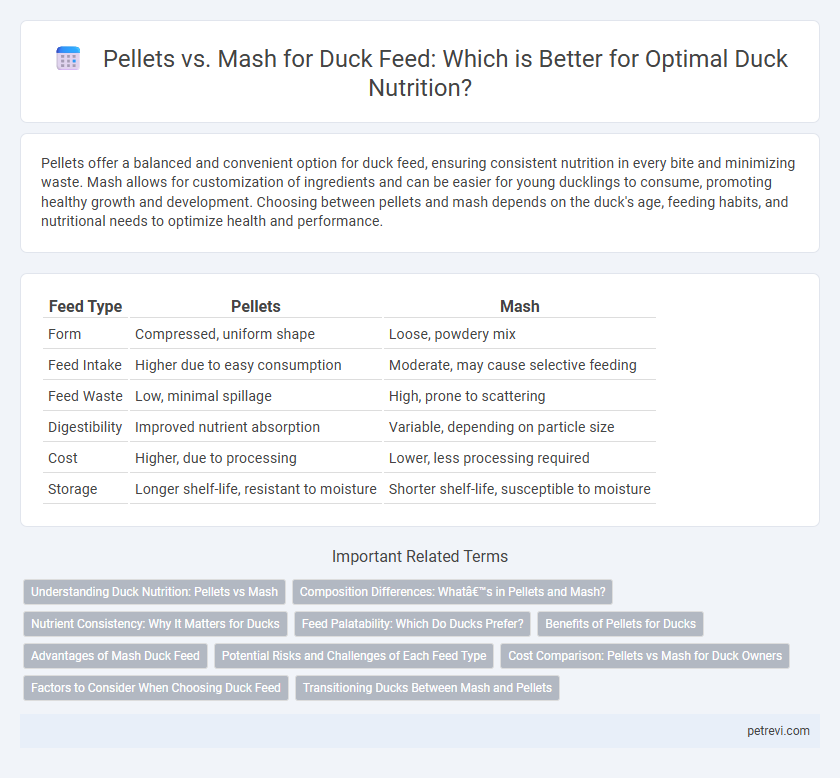Pellets offer a balanced and convenient option for duck feed, ensuring consistent nutrition in every bite and minimizing waste. Mash allows for customization of ingredients and can be easier for young ducklings to consume, promoting healthy growth and development. Choosing between pellets and mash depends on the duck's age, feeding habits, and nutritional needs to optimize health and performance.
Table of Comparison
| Feed Type | Pellets | Mash |
|---|---|---|
| Form | Compressed, uniform shape | Loose, powdery mix |
| Feed Intake | Higher due to easy consumption | Moderate, may cause selective feeding |
| Feed Waste | Low, minimal spillage | High, prone to scattering |
| Digestibility | Improved nutrient absorption | Variable, depending on particle size |
| Cost | Higher, due to processing | Lower, less processing required |
| Storage | Longer shelf-life, resistant to moisture | Shorter shelf-life, susceptible to moisture |
Understanding Duck Nutrition: Pellets vs Mash
Pellets provide a balanced, nutrient-dense option that ensures ducks receive consistent vitamins, minerals, and protein essential for growth and egg production. Mash offers a flexible, customizable feed form that can be mixed easily with supplements and encourages natural foraging behavior, promoting better digestive health. Understanding these differences helps optimize duck nutrition by matching feed form with the specific dietary needs and feeding habits of the flock.
Composition Differences: What’s in Pellets and Mash?
Pellets for duck feed consist of compressed ingredients like grains, proteins, vitamins, and minerals, ensuring balanced nutrition and minimal wastage. Mash feed contains similar components but remains loose and uncompressed, allowing ducks to select preferred particles, which may lead to uneven nutrient intake. The composition of pellets promotes consistent nutrient delivery, while mash offers flexibility in ingredient variety and texture.
Nutrient Consistency: Why It Matters for Ducks
Pellets provide consistent nutrient distribution in every bite, ensuring ducks receive a balanced diet essential for optimal growth and health. Mash feed often separates, leading to selective eating where ducks may consume more of certain nutrients while missing others, resulting in uneven nutrition. Maintaining nutrient consistency through pellets supports uniform weight gain, improved immunity, and better overall production in ducks.
Feed Palatability: Which Do Ducks Prefer?
Ducks generally prefer pellets over mash due to higher feed palatability, as pellets offer a consistent texture and easy consumption that appeals to their foraging instincts. Pellets minimize feed wastage compared to mash, which can be dusty or crumbly, reducing overall intake efficiency. Studies indicate that ducks exhibit increased feed intake and growth rates when consuming pellets, highlighting the importance of pellet form in optimizing duck nutrition.
Benefits of Pellets for Ducks
Pellets provide a uniform and balanced nutritional profile that ensures ducks receive consistent vitamins, minerals, and protein in every bite, promoting optimal growth and health. Their compact form reduces feed wastage and spoilage, making feeding more efficient and cost-effective for duck owners. Pellets also improve digestion by minimizing selective feeding behavior common with mash, helping ducks absorb nutrients more effectively.
Advantages of Mash Duck Feed
Mash duck feed offers superior digestibility and nutrient absorption compared to pellets, promoting optimal growth and health in ducks. Its fine texture allows for easier intake by ducklings, reducing waste and ensuring consistent feeding. Mash feed can be customized with a precise blend of vitamins and minerals to meet specific dietary requirements of ducks at various life stages.
Potential Risks and Challenges of Each Feed Type
Pellets offer uniform nutrient distribution and reduce feed waste but pose risks such as choking hazards and lower adaptability for young ducks with weaker beaks. Mash feed allows easier consumption and greater flexibility in ingredient mixing but can lead to selective feeding, nutritional inconsistency, and higher feed contamination risk due to moisture exposure. Both feed types require careful management to balance nutritional benefits against safety and sanitation challenges in duck farming.
Cost Comparison: Pellets vs Mash for Duck Owners
Pellets for duck feed typically cost more upfront than mash due to the processing required to form dense, uniform shapes, but their higher feed conversion efficiency often results in lower overall feeding expenses. Mash feed is usually cheaper per ton but can lead to increased waste and inconsistent nutrition, potentially raising long-term costs for duck owners. Evaluating both options, pellets may offer better value over time despite higher initial costs, especially in larger-scale or commercial duck operations.
Factors to Consider When Choosing Duck Feed
Nutritional composition and digestibility are critical factors when choosing between pellets and mash for duck feed, as pellets typically offer more uniform nutrient distribution and reduce feed waste. Consider the age and size of the ducks; pellets are generally easier for adult ducks to consume, while mash may be better suited for ducklings due to its softer texture. Storage conditions and feed handling also influence the choice, with pellets having a longer shelf life and less dust compared to mash.
Transitioning Ducks Between Mash and Pellets
Transitioning ducks between mash and pellets requires careful management to avoid digestive issues and ensure nutrient absorption. Gradual introduction of the new feed over 7-10 days helps ducks adapt to the texture and composition differences, preventing feed refusal and promoting consistent growth. Monitoring feed intake and adjusting water availability during this period supports smooth digestion and maintains overall health.
Pellets vs Mash for Duck Feed Infographic

 petrevi.com
petrevi.com